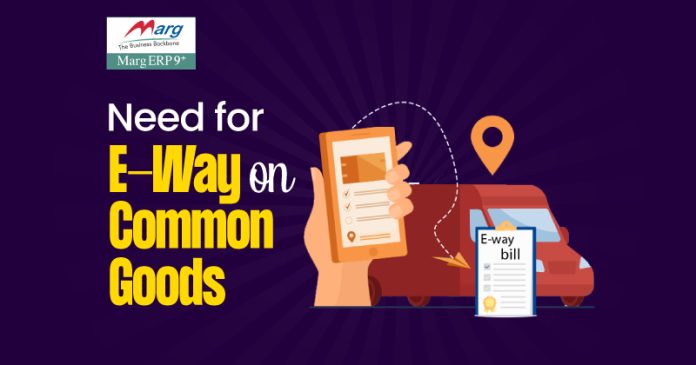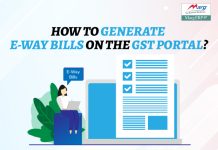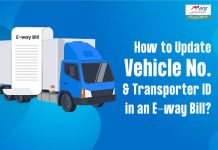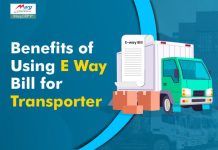Starting on the 1st of April 2018, an E-Way Bill became mandatory for all inter-state and intra-state transactions.
It is to be generated when the value of goods being transported is more than Rs. 50,000. However, the new regime also entails a list of exemptions for the goods and for the type of conveyance that do not require an E-Way Bill. It is a list comprising 153 items and the types of conveyance. In this article, we will get to know about these items and transportation types.
Goods Exempted from E-Way Bill
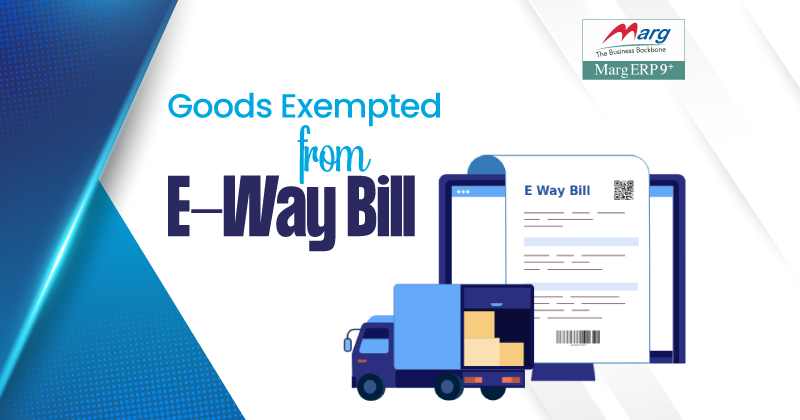
Following are the goods that are included in rule 138(14) of the GST Laws stating that they do not require an E-Way Bill print for the movement.
- Live Animals (like, horses, mules, hinnies, swine, sheep, goats, bovine animals, live poultry, and other birds, insects, and mammals.)
- Meat and Edible Offal (animals such as swine, sheep, goat horses, mules, hinnies, bovine animals, and poultry. Fresh, chilled, and frozen. [ other than frozen and stored in individual containers])
- Fish. fresh and chilled, fish seeds, prawns, shrimp.
- Aquatic Invertebrates. (like molluscs, crustaceans, with or without shells, fresh or live. And other aquatic invertebrates.)
- Milk and products. ( fresh, pasteurised, separated, cream, not concentrated, curd, lassi, buttermilk, paneer, chenna [ except, Ultra High temperature (UHT) milk, and except for being packed in individual containers registered with a brand name])
- Birds’ Eggs.
- Natural honey (except for being packed in individual containers registered with a brand name)
- Human hair, and waste of human hair.
- Bones and horn cores (unworked) powder and waste of these products.
- Hoof meal, horn meal, hooves, claws, nails and beaks antlers, etc.
- Semen and frozen semen.
- Trees and plants and their parts, bulbs, roots, cut flowers, and ornamental foliage.
- Vegetables. (Onions, shallots, garlic, leeks Cabbages, cauliflowers, kohlrabi, kale Lettuce chicory Carrots, turnips, salad beetroot, salsify, celeriac, radishes and similar edible roots, Cucumbers and gherkins, fresh, chilled or dried.)
- Coconuts. Fresh or dried, peeled or unpeeled.
- Nuts, like, Hazelnuts, Almonds or walnuts, filberts, Pistachios, Macadamia nuts, Chestnuts, Kola nuts, Brazil nuts, Areca nuts.
- Fruits. (Dates, figs, pineapples, avocados, guavas, mangoes, and mangosteens, oranges, mandarins (including tangerines and satsumas); clementines, wilkings, and similar citrus hybrids, grapefruit, including pomelos, lemons, limes, grapes, melons, papaya, apples, pears, quinces, apricots, cherries, peaches (including nectarines), plums and sloes, strawberries, raspberries, blackberries, mulberries and loganberries, black, white or red currants and gooseberries, cranberries, bilberries and other fruits of the genus vaccinium, kiwi fruit, durians, persimmons, pomegranates, tamarind, sapota (chico), custard-apple (ata), bore, litchis, peel of citrus fruit or melons)
- Coffee beans, not roasted.
- Unprocessed, green leaves of tea.
- Cereals. Wheat, meslin, rye, barley, oats, maize, rice, grain sorghum, buckwheat, millet and canary seeds, jawar, bajra, ragi. (except for being packed in individual containers registered with a brand name)
- Seeds. Soya beans, ground nuts, linseed, rape or colza seeds, palm nuts, melon seeds, poppy seeds, jams, and mango kernels, and niger seeds. Oil seeds like mustard seeds, castor oil, sunflower seeds.
- Puffed rice, beaten rice, parched rice, parched paddy.
- Papad.
- Bread (except pizza bread)
- Water ( except, aerated mineral, purified, distilled, medicinal, ionic, battery, de mineralized, sealed in containers)
- Tender coconut water. ^
- Aquatic Feed.
- All types of salts.
- All types of contraceptives.
- Kajal, kumkum, bindi, sindur, altaa.
- Municipal waste, clinical waste, sewage sludge.
- Firewood, fuelwood, and wood charcoal.
- Judicial and nonjudicial stamps. Post items like envelopes, postcards and more authorised by the government.
- Rupee notes, sold to the Reserve Bank of India. Check, loose or in book form.
- Printed books, including braille newspapers, journals, periodicals, children’s picture drawings, or colouring books.
- Earthen pot and clay lamps.
- Agricultural implements that are manually operated or animal driven i.e. Hand tools, such as spades, shovels, mattocks, picks, hoes, forks, and rakes; axes, bill hooks, and similar hewing tools; secateurs and pruners of any kind; hay knives, sickles, scythes, hedge shears, timber wedges and various other tools used in agriculture, forestry and horticulture.
- Puja samagri that includes:
(i) Rudraksha mala, rudraksha, tulsi kanthi mala, panchgavya (a combination of desi ghee, cow dung, milk, and curd)
(ii) Sacred thread (commonly known as yagnopavit);
(iii) Wooden khadau;
(iv) Panchamrit,
(v) Vibhuti sold by religious institutions,
(vi) Unbranded honey
(vii) Wick for diya.
(viii) Roli
(ix) Kalava (Raksha sutra)
(x) Chandan Tika
- Liquefied petroleum gas that is supplied to customers that fall under the domestic and non-domestic exempted category (NDEC)
- Pearls that are natural or cultured, precious or semi-precious stones; precious metals, and metals clad with precious metal.
There is no requirement for an e-way bill for exempted goods mentioned above. Transporters said need not carry an e-way bill print.
Transactions That Are Exempted from the E-Way Bill
- Goods less than the value of Rs. 50,000 do not require an E-Way Bill.
- An E-Way requirement is not mandatory when the transported goods are under customs seal or supervision
- When the transported goods are in transit from or to Nepal or Bhutan.
- When the central or state government acts as a consigner or consignee of the goods being transported, an e-way bill is not required.
- No E-Way bill generation is required during empty cargo transits.
Documents to Be Carried in Case When the E-Way Bill Is Not Required
In aforementioned, cases when an E-Way bill requirement is not necessary. The transporters still need to carry a set of documents, to ensure the smooth functioning of their transportation.
The documents that they are required to carry are the ones as per the provisions made under the GST Laws. They are as follows:-
- Tax invoice,
- Delivery challan,
- Transporters’ ID proof,
- Transporters’ document number,
- Transporter’s vehicle number.
Conclusion
In conclusion, if a taxpaying transporter falls under any of the exemption categories mentioned above, they are not required to generate an e-way bill for their transactions. However, they still need to abide by the rules and carry specific documents per the GST laws. Any taxpayer not in possession of the said documents may be subjected to legal offences and penalties.
More Relevant Posts
How You Can Generate an E-Invoice in 5 Simple Steps
How to Easily Avoid GST Penalties?
Top 9 Tried and Tested Tactics for Stress-Free GST Return Filing
How to Generate E-Way Bills on the GST Portal?
Frequently Asked Question
What types of transactions do not necessitate an e-way bill?
Transactions that include the goods that are exempted in rule 138(14) of the GST regime apply to non-requirement on an e-way bill. Other transportation with government supervisors are also exempted from an e-way bill requirement.
How do I determine if my business does not qualify for the e-way bill requirement?
In order to determine if the transportation of your business needs an e-way bill generated you need to refer to the latest guidelines provided by the GST authorities in your respective jurisdiction. These guidelines will help you determine if the goods you need to be transported need an e-way bill generation or not.
Do temporary movements of goods, such as for exhibitions or demonstrations, require an e-way bill print?
Transportation for goods for, exhibition, demonstration, and other similar purposes is exempted from getting an e-way bill generated, under certain conditions. However, you should confirm with the relevant authorities or consult the specific regulations governing such transactions. You can read more about it on the e-way bill portal.
Are goods transported within a specific distance exempt from the e-way bill requirement?
If the distance between the consignor’s location and a transporter’s location is less than 50 kms then an e-way bill generation is not to be made.

